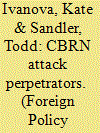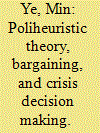|
|
|
Sort Order |
|
|
|
Items / Page
|
|
|
|
|
|
|
| Srl | Item |
| 1 |
ID:
080147


|
|
|
|
|
| Publication |
2007.
|
| Summary/Abstract |
Based on zero-inflated negative binomial regressions applied to the Monterey weapons of mass destruction data, this article assesses the future risks from chemical, biological, radiological, and nuclear (CBRN) terrorism. Once the threshold for CBRN attacks is surpassed, further attacks arise: the expected number of CBRN incidents is over one and a half times higher than past events. Religious cults and groups with a transnational orientation pose the largest CBRN threat to society. Other things constant, nationalists/separatists and religious fundamentalists are not more apt to engage in CBRN terrorism than compared to "other groups." Democratic and corrupt regimes are the likely venues for CBRN incidents. Based on past incidents, rich countries are especially vulnerable to CBRN terrorism. Thus, recent actions by the U.S. Department of Homeland Security to put more resources into guarding against CBRN attacks appear sound. This study indicates that nonfundamentalist terrorists also present CBRN risks to democracies. From a foreign policy viewpoint, CBRN terrorism is not a problem that rich democratic countries can confront alone, because the terrorists will move to where there is the least vigilance. Our study indicates the likely perpetrators and types of attacks that nations must cooperate to avoid
|
|
|
|
|
|
|
|
|
|
|
|
|
|
|
|
| 2 |
ID:
080148


|
|
|
|
|
| Publication |
2007.
|
| Summary/Abstract |
In the aftermath of the Cold War, U.S. foreign policy dialogue has shifted from its half century focus dominated by the superpower struggle with the Soviet Union to the challenges presented by so-called "rogue states." For many observers, however, the term "rogue state" is viewed as problematic failing to providing either a clear picture of who and what constitutes a rogues state, or, perhaps more importantly, the ramification of this term on U.S. policy action. In examining the public statements of key U.S. foreign policy decision makers over the course of 1993 to 2004, this paper offers insights as to the perceptions which manifest the "rogue" stereotype as exhibited by statements on the policies and behaviors associated with rogue states. What is revealed is a relatively fixed and stable image over time as held by key decisions-makers with similar unity expressed as to policy prescriptions. Combining perceptions of power capabilities and cultural judgments unique to this rogue stereotype, the rogue image presents a challenge to U.S. strategy demanding attention to the future threat posed by these states while also constraining policy options.
|
|
|
|
|
|
|
|
|
|
|
|
|
|
|
|
| 3 |
ID:
080149


|
|
|
|
|
| Publication |
2007.
|
| Summary/Abstract |
In the past decade, the application of the Poliheuristic (PH) theory to foreign policy decisions of various types, by numerous leaders, and in association with different research methods, has demonstrated its theoretical merit in integrating the divided rational choice and psychological/cognitive approaches. This article argues for a complementary relationship between PH and formal theory. On the one hand, PH can provide a framework in which abstract formal models can be connected with specific domestic as well as international circumstances. On the other hand, formal theory sharpens the rational analysis used in the second conceptual stage of PH. In this study, I formulate a revised Rubinstein bargaining model with war as an outside option and apply it to Chinese crisis decision making during the Second and Fourth Taiwan Strait Crisis. In sum, this study makes three contributions to the literature on international crises and foreign policy analysis. First, it gives formal explanations on how PH can contribute to the game-theoretic approach in foreign policy analysis. Second, it presents what Bueno de Mesquita and Lalman (1992) called a "domestic politics version" of the canonical Rubinstein bargaining game, connecting international interactions with individual participants' domestic politics. Finally, it provides a way to test abstract game-theoretic models in particular domestic and international contexts of foreign policy making.
|
|
|
|
|
|
|
|
|
|
|
|
|
|
|
|
| 4 |
ID:
080150


|
|
|
|
|
| Publication |
2007.
|
| Summary/Abstract |
This paper is about the epistemological underpinnings of European and American foreign policy toward political Islam. European and American approaches to political Islam rely upon commonly held secular assumptions about religion and politics that have significant effects on foreign policy in Europe and the United States. Secularist epistemology produces an understanding of "normal politics" that lends a particular coloring to the politics of Muslim-majority societies. These secularist understandings affect foreign policy in two ways: first, the appearance of Islam in politics is equated with fundamentalism and intolerance, and second, the forms and degrees of separation between Islam and politics that do exist in contemporary Muslim-majority societies either do not appear at all or appear as ill-fitting imitations of a Western secular ideal. Rather than a backlash against modernity or a return to tradition, political Islam is a modern language of politics that challenges and, at times, overturns fundamental assumptions about religion and politics embedded in Western forms of secularism
|
|
|
|
|
|
|
|
|
|
|
|
|
|
|
|
|
|
|
|
|